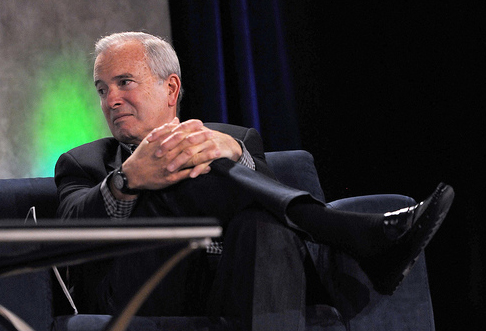There are many unpardonable qualities within Zadie Smith’s recent New Yorker confessional, which should bother anyone who has even a shred of empathy for anyone making less than $50,000 a year.
There is the embarrassment in Zadie Smith blabbering about a very private matter with a “friend” in a very public magazine (did further calumny emerge when the New Yorker‘s notoriously thorough fact checkers contacted this woman?). There is Zadie Smith’s callousness in collecting a loan from someone who is clearly impoverished (particularly when the money was “no skin off my nose,” as Zadie Smith reports; it is certainly “no skin off my nose” to buy a homeless man a sandwich from time to time, but one would never consider asking for the sandwich back). There is Zadie Smith using her privileged position as a New Yorker contributor, where she will collect a check she really doesn’t need for an article in which her friend receives no compensation (indeed, if anyone who knows both Zadie Smith and “Christine” connect the dots, Zadie Smith’s friend actually loses some “value” in this Faustian bargain). Zadie Smith characterizes her previous self as “a working-class girl who’d happened upon money” with her “essential character unchanged,” which sets up Zadie Smith, a 34-year-old debutante, to come out to her discreetly charming bourgeoisie demographic. (We do know that Zadie Smith attended the Franzen party, where she was “surrounded” by Nathan Englander, Mark Ronson, and Patrick McGrath. It would be difficult indeed to detect blue-collar bonhomie from this bunch.)
In short, Zadie Smith has written a tremendously insensitive article that is essentially the confession of a selfish and stingy ablutomaniac who seems to possess little desire in comprehending the motivations of anyone outside her bubble. This is the same novelist (“Fail Better!”) who confessed that she couldn’t write fiction after reading David Shields’s Reality Hunger, but who didn’t even have the guts to stand by her words — much as she didn’t have the nerve years ago to stand by her characterization of England as “a disgusting place”. (Go to the Guardian site now and you’ll see that the Shields article “has been removed as our copyright has expired.” And isn’t it interesting that this essay, published in The Guardian, on November 21, 2009, didn’t appear in the paperback version of Changing My Mind, while there’s no such problem with other essays published at The Guardian. One expects such cowardly backtracking from an army of publicists surrounding an overly protective Hollywood actor.)
But it’s this George Sand mess that I feel the overwhelming need to clean up. From Zadie Smith’s article:
Until this episode, I’d thought of myself as a working-class girl who’d happened upon money, my essential character unchanged. But money is not neutral; it changes everything, including the ability to neutrally judge what people will or will not do for it. George Sand: “Charity degrades those who receive it and hardens those who dispense it.” Well, it needn’t, but it does the way I do it.
Forget the split infinitive. The Sand quote, which Zadie Smith has lazily leeched from the shaky Thinkexist.com website, doesn’t appear in five editions of Bartlett’s Quotations that I consulted. And that’s because the quote doesn’t really come from Sand, but from a character within La Comtesse de Rudolstadt: a youthful-looking, middle-aged Zingara with a beautiful guitar beneath her cloak who is trying to express how she lives and relates to other people. Zadie Smith (like many self-published quotation books before her) leaves out a key part of the passage she’s quoting from. Here is the appropriate context:
Charity degrades those who receive it and hardens those who dispense it. All that is not a true exchange will disappear in the future society. We, I and my mate, practice that exchange and so enter the ideal.
This specific translated phrasing can be found in Joseph Amber Barry’s Infamous Woman: The Life of George Sand (New York: Doubleday, 1978), 284. Barry quotes from a three volume edition that was published in Paris in 1959. Regrettably, he doesn’t indicate whether or not this is his own particular translation from the French. (There was a three volume Classiques Garnier edition of La Comtesse de Rudolstadt published in 1959.) But other translations of the same passage suggest that Sand was getting at much more than some facile “leave them out in the cold because they won’t appreciate your succor” philosophy, as implied by Zadie Smith, the self-declared “financial illiterate.”
Here is the Gretchen Jane Van Slyke translation: “We, on the other hand, we have no need of the rich man’s money, we’re not begging; alms demean the receiver and harden the giver. Everything that is not exchange must disappear in future society. In the meantime, God allows my husband and me to practice that life of exchange and thereby to partake of the ideal.”
The Francis G. Shaw translation: “As for ourselves, we have no need of the money of the rich; we do not beg; alms debase him who receives and harden him who gives. All that is not exchange must disappear from the society of the future. In the meanwhile God permits us, my husband and myself, to practice this life of exchange and thus enter into the ideal.”
The Frank H. Potter translation: “We do not need the money of the rich, we do not beg; alms degrade those who receive them and harden those who give them. All that is not an exchange should disappear from the society of the future. Meanwhile, God permits my husband and me to practice this exchange, and thus to enter into the ideal.”
The Sand quote is one of the article’s most irresponsible components. For it paints George Sand — a literary figure who was very much concerned with charity — as a Reagan Republican. Let the bums starve on the streets. They’ll feel degraded anyway. And you, the benign charity giver, will harden your heart. It’s all about money, which isn’t neutral. Etcetera.
This clearly isn’t what the Zingara suggests at all. The rather idealistic viewpoint being promulgated by Sand’s characters is that all actions should be predicated upon exchange and that life, which does involve giving and receiving, would be more manageable with mutual consideration.
Zadie Smith chooses to view her exchange with her “friend” Christine as one that is centered around material goods. Give the “loan” to a friend and ask for the money back, rather than give the “loan” to a friend because it is the kind thing to do. Whoops! It was never about giving the money back. Christine then performs the charity of forgiving Zadie Smith, perhaps hoping that Zadie Smith will learn that what she did was extremely shitty. A fair enough exchange. But Zadie Smith hasn’t learned at all. Zadie Smith feels “degraded.” So Zadie Smith seeks a new form of exchange by memorializing this incident for the New Yorker in a professional capacity, where, presumably, others reading the incident will be able to pay this “exchange” forward. But it’s not really an exchange at all, because Zadie Smith will be remunerated materially for her inhumane solecism.
Writers routinely mine from their own personal experience. This has been true of artists as far back as Lascaux. But George Sand was very clear about how charity factored into her craft. Here is her epigraph to her autobiography, Story of My Life:
Charity before others; Dignity towards oneself; Sincerity before God. Such is the epigraph of the book I undertake. — April 15, 1847
The date is only five years after she had written La Comtesse de Rudolstad.
In an October 28th, 1854 letter, Sand would write to Armand Barbès:
But let me tell you what my sentiments are. There are actions which are beautiful and good. Charity may impose silence upon honor itself. I do not mean real honor, that which we keep intact and serene in the depths of our conscience, but visible and brilliant honor, honor as a work of art and as an historical glory. (Emphasis in original)
Barbès, of course, was an opponent of the July Monarchy — a period in French history when the haute bourgeoisie very much dealt the cards. When the Society for the Rights of Man was broken up by the police, Barbès created the Society of Avengers and was thrown into prison. There was also the Society of Seasons. In 1849, Barbès was sentenced to life imprisonment after attempting to bring down Auguste Blanqui, a one-time revolutionary collaborator who had become his enemy.
Barbès was, as many histories have shown, a fiery and colorful character. Sand was a friend. She was responding to Barbès’s sentiment (“I acted in a moment of surprise, when thinking more of my own interests than of those in the cause”) in relation to the Blanqui incident. She knew Barbès to be capable of charity.
In a May 11th, 1861 letter, Sand would write to her cousin Pauline Villot, in reference to the possibility of the Academic Francaise proposing Sand as a candidate for the Gobert prize:
I should not think it honest to accept a charity to which others in worse circumstances have real claims. Should the Academy accord me the prize, I would accept it, not without regret, but so as not to pose defiantly and to allow the morality of my works (which are said to be immoral) being openly declared. (Emphasis in original)
In other words, should any writer accept a great honor, they should view the honor as a form of exchange. The charity should be reciprocal. And as far as Sand was concerned, that reciprocity extended to not delimiting the morality contained within her work.
Aside from her experiential blunder, why then is Zadie Smith showing so little charity to the intricate moral questions contained within George Sand’s work? Why does Zadie Smith show so much dishonor not only to her friend, but the moral possibilities of writing?
It is because Zadie Smith does not appear to understand this vital “exchange” component of charity. It is because Zadie Smith blithely assumes that the New Yorker readership does too. It is because Zadie Smith has given George Sand a superficial read.
One must therefore ask how Zadie Smith will be able to take up the Harper’s New Books column with anything less than self-serving motivations. One of Zadie Smith’s predecessors — the late John Leonard, who wrote the same Harper’s column for many years — objected in 2007 to the sense of opportunism and entitlement that afflicted so many young critics. But now those young critics are growing up. Like Zadie Smith, the critics who remain entitled now approach writing not as a calling, but as a way to declare how little they care for viewpoints outside their own. That isn’t charity by any definition. It’s a writing approach that has the rare distinction of both degrading and hardening its practitioners.



 Correspondent: There’s one question that is presented in the book, but never actually quite answered. It’s probably something I just observed. And that is Google’s fixation with the number 150. They have 150 projects. They have cafeterias and conference rooms that are max 150. Did you ever get an answer as to why they were obsessed with this number? Numerologists?
Correspondent: There’s one question that is presented in the book, but never actually quite answered. It’s probably something I just observed. And that is Google’s fixation with the number 150. They have 150 projects. They have cafeterias and conference rooms that are max 150. Did you ever get an answer as to why they were obsessed with this number? Numerologists?